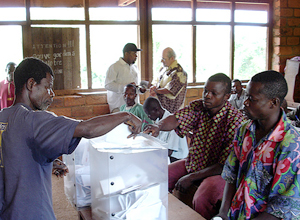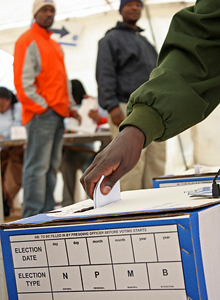|
Mediating Election-Related Conflicts
ReliefWeb
July 14, 2009
by Chris Fomunyoh
Full Report (pdf format - 273 Kb)
Introduction
 Beyond major conflicts in Africa over the territorial integrity of states such as Sudan and Somalia, many recent conflicts on the continent are ignited by grievances over bad governance and exclusionary political practices. In many cases, flawed or failed elections have either precipitated political disputes or aggravated simmering tensions into an outburst of conflict. For example, in the last five years, violent conflicts have ensued from the competition for political power in Africa as demonstrated by dramatic election-related crises in Ethiopia, Kenya and Zimbabwe. While the magnitude of hostilities in all cases may not rise to the level of armed conflict or civil war, invariably, many lives are lost, property destroyed, societies are further polarized and democratization efforts are either stalled or reversed. In some cases, intense and long drawn-out disputes over electoral processes and outcomes raise questions about the legitimacy of the winning party and candidate through the duration of that candidate's term of office. Beyond major conflicts in Africa over the territorial integrity of states such as Sudan and Somalia, many recent conflicts on the continent are ignited by grievances over bad governance and exclusionary political practices. In many cases, flawed or failed elections have either precipitated political disputes or aggravated simmering tensions into an outburst of conflict. For example, in the last five years, violent conflicts have ensued from the competition for political power in Africa as demonstrated by dramatic election-related crises in Ethiopia, Kenya and Zimbabwe. While the magnitude of hostilities in all cases may not rise to the level of armed conflict or civil war, invariably, many lives are lost, property destroyed, societies are further polarized and democratization efforts are either stalled or reversed. In some cases, intense and long drawn-out disputes over electoral processes and outcomes raise questions about the legitimacy of the winning party and candidate through the duration of that candidate's term of office.
Election-related disputes raise special challenges, particularly around issues such as: how to revive political will and recreate neutral space for citizen participation and confidence in various aspects of the country's governance process; and how potential mediators from within national boundaries or the international community can walk the fine line of respecting the sovereignty of nation-states while at the same time giving high regard to universal principles such as the responsibility to protect in cases where disputes spill over into full blown conflict. Regional and international actors also face the dilemma of intervening if called upon to do so by one of the parties, and the difficulties of undertaking mediation efforts without the approval and collaboration of the host country government. In Zimbabwe, for example, many observers believe that by limiting mediation efforts within the realm of the Southern African Development Community (SADC – a regional entity in which incumbent President Mugabe held swear over some of the other leaders) to the exclusion of other international actors, the country missed an opportunity to mitigate the negative impact of further polarization and civil strife in the aftermath of the very controversial parliamentary and presidential elections of March 2008.
 While there is a general understanding that elections alone do not a democracy make, there is also recognition that multiparty elections are a necessary pillar in democratic governance. The Universal Declaration of Human Rights provides for citizens to have the rights to elect their representatives through regular elections. As members of the United Nations, all African countries adhere to the Universal Declaration, and many of them cross reference its provisions in the preambles of their respective constitutions. Elections therefore serve a primordial function in every democratic society. In some cases, peace agreements for countries emerging from armed conflict provide a timeframe for elections in a bid to obtain legitimacy for those that win power, and also in the hopes of providing an opening for former belligerents to transform themselves into more positive political actors that resort to ballots rather than bullets to make their voices heard. If properly organized, elections, even when conducted as part of a post-conflict agreement or strategy can in fact lend legitimacy to the government that emerges; as was the case with the post-conflict election in 2005 in Liberia won by current President Ellen Johnson Sirleaf. Conversely, failed elections can exacerbate further conflict. For example, an attempt to hold competitive multiparty elections in Angola in 1992 — the first such effort since the country achieved independence in 1974 – reignited armed conflict supposedly because the parties were not prepared or the elections were premature. While there is a general understanding that elections alone do not a democracy make, there is also recognition that multiparty elections are a necessary pillar in democratic governance. The Universal Declaration of Human Rights provides for citizens to have the rights to elect their representatives through regular elections. As members of the United Nations, all African countries adhere to the Universal Declaration, and many of them cross reference its provisions in the preambles of their respective constitutions. Elections therefore serve a primordial function in every democratic society. In some cases, peace agreements for countries emerging from armed conflict provide a timeframe for elections in a bid to obtain legitimacy for those that win power, and also in the hopes of providing an opening for former belligerents to transform themselves into more positive political actors that resort to ballots rather than bullets to make their voices heard. If properly organized, elections, even when conducted as part of a post-conflict agreement or strategy can in fact lend legitimacy to the government that emerges; as was the case with the post-conflict election in 2005 in Liberia won by current President Ellen Johnson Sirleaf. Conversely, failed elections can exacerbate further conflict. For example, an attempt to hold competitive multiparty elections in Angola in 1992 — the first such effort since the country achieved independence in 1974 – reignited armed conflict supposedly because the parties were not prepared or the elections were premature.
Overall, by their very competitive nature, elections in fragile states generate extensive political activism and participation, and generally add stress to existing political systems and their nascent institutions. Activities surrounding elections tend to bring to the fore issues such as the right of free association as citizens and candidates engage in campaign activities across the country; the independence and impartiality of the judiciary, which may be called upon to rule on election-related grievances, and needs to assure citizens that they can obtain fair and equitable recourse through non-violent means; the professionalism and neutrality of the military, the police and other security services; and the faith of citizens in civil discourse and tolerance of diverse viewpoints. When poorly conducted, elections exacerbate tensions and can spark conflict in transitional societies with fragile institutions.
Elections, even when successful, cannot be considered an end in themselves. Rather, elections need to be viewed as a means to achieving the greater aspirations of good governance by citizens in a democratic society or in a democratizing environment. Elections should be viewed as an important step in the continuum of ongoing political and social interactions among citizens and leaders in a given nation-state, involved in negotiations and frequent renewal of the social compact and not be treated solely as a technical exercise that takes place on election day. A holistic or comprehensive approach to elections allows political actors and various stakeholders to identify flash points or early warning signs for potential conflicts, so as to be better prepared to seize opportunities for eventual monitoring and mediation by national and international actors. Such a comprehensive approach views elections through the broader prism of political (as opposed to technical) undertakings, and the full array of conflict mediation tools ought to be activated or deployed to prevent or quickly resolve election-related conflict.
How elections are managed, and responses to election related tensions by various stakeholders – prior to, during and after elections – underscore the linkages between mediation activities and election monitoring by both domestic and international groups. Experience has shown that there is a nexus of overlapping interventions possible when seeking to conduct peaceful elections in conflict prone societies, predicting flashpoints for potential conflicts around elections, and contemplating concrete steps that could be taken to mitigate and mediate conflicts that emerge there from. Also, there are many different forms that mediation can take, at each phase of the electoral process. Traditionally, while much effort is focused on preventive mediation – addressing disputes prior to the eruption of violent conflict, in some cases,"crisis response" mediation will be required, as was in both Kenya and Zimbabwe. Each form of mediation takes a specific approach and requires different actors and strategies. Reviewing the full electoral process through the lens of mediation is therefore important.
With over 20 national elections expected to take place in Africa in 2009 and 2010, there is a growing interest in obtaining a better understanding of mechanisms that could enhance the efficacy of mediation efforts around elections so as to mitigate humanitarian crises and make a long lasting positive impact on the governance process, especially for countries engaged in post-conflict reconstruction and reconciliation.
Copyright © 2009 ReliefWeb
|

